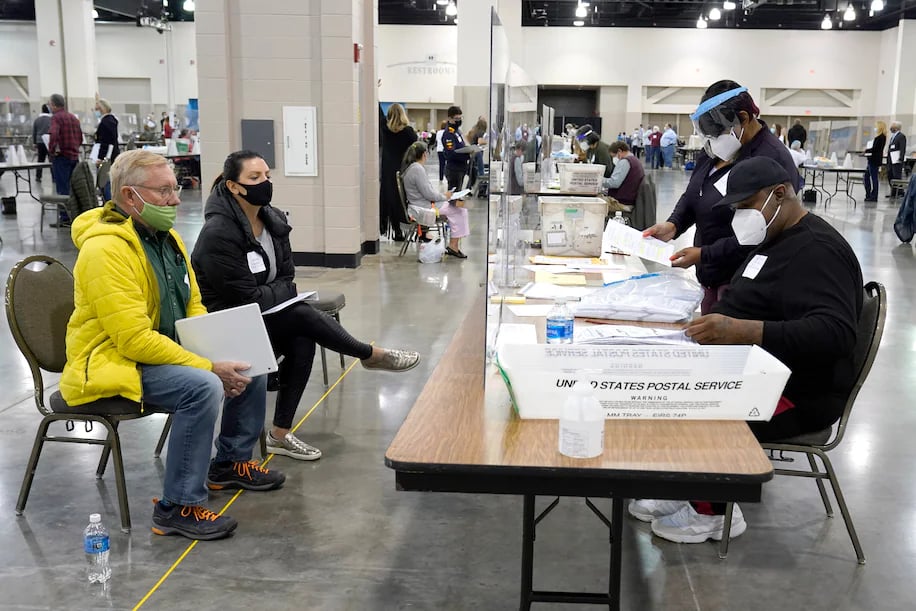GOP Targets Phantom Fraud, Not Unsolved Crimes
COMMENTARY

Half of Florida’s violent crimes go unsolved. When serious property offenses are added, the overall crime “clearance rate” plummets to 25%.
Sadly, Florida is typical, according to FBI statistics. In 2020, investigators cleared barely half the nation’s murders. In Georgia, officials in 2019 reported 2,508 alleged rapes and 216 arrests.
It might surprise you, then, to learn the focus of recently proposed crime-fighting initiatives in these states. They include Florida Gov. Ron DeSantis’ successful push for a new enforcement agency (he wanted 52 staffers, but will get about 15), with a budget of $3.7 million. The target isn’t murder or larceny. It’s “election crimes,” a purported danger for which there is infinitesimally little evidence.
These efforts are led by Republicans bent on continuing to confuse and frighten Americans about election security. They’re echoing Donald Trump’s falsehoods about a “stolen” 2020 election.
These Republicans know the election had virtually no meaningful hiccups, and that multiple investigations into alleged voter conspiracies have gone nowhere.
Their endless complaints about the 2020 election are a barely disguised ruse to lay the groundwork for challenging the next presidential election, when another narrow Trump loss is clearly possible. Psychologists call it the “illusory truth effect”: repeat a lie often enough and people will eventually believe it. After all, if there’s so much noise and smoke about elections, there must be a fire somewhere, right?
It would be laughable if the threat to American democracy weren’t so dire. DeSantis himself called Florida’s 2020 election process “the gold standard.”
This description, however, quickly clashed with MAGA conspiracy theories of bizarrely clever (and invisible!) Democratic tricks to somehow steal the election from Trump. It didn’t matter that GOP-controlled states couldn’t find a scintilla of evidence. Lengthy probes of alleged voter fraud in Florida in 2018 and Arizona in 2020 ended with no charges. A 2021 investigation by the Associated Press found fewer than 475 potential claims of fraud out of 25.5 million presidential ballots cast in six highly contested states.
Generating fear, not facts, is the goal for DeSantis and other Republicans who tell Americans they somehow suddenly cannot trust the nation’s voting process.
DeSantis’ new plan seems two-pronged: Keep ginning up unfounded fears of election skullduggery and intimidate potential Democratic poll-watchers and voters by hinting they might become ensnared in a newfangled dragnet.
The governor said his proposed Office of Election Crimes and Security would hire officers to “investigate, detect, apprehend and arrest anyone for an alleged violation” of election laws. They could act on anonymous tips from anyone.
In Georgia, Republican David Perdue — a Trump ally and former senator now running for governor — wants to create an election police force “to make Georgia elections the safest and securest in the country.”
Some top Republicans hardly conceal their true goal: seizing control of the 2024 election outcome. Republican U.S. Sen. Ron Johnson of Wisconsin has urged his state’s GOP-controlled legislature to wrest authority for overseeing voting from the state’s bipartisan elections commission.
Florida authorities prosecuted exactly one case of alleged voter fraud in 2020. That’s 0.000009% of the 11 million ballots cast.
Agencies in Florida, Georgia and elsewhere that fight crime — real crimes, not make-believe “rigged elections” — clearly could use more money. What a pity that some leaders want to spend millions cynically chasing phantoms.
Charles Babington covered Congress, the White House and politics for The Washington Post and the Associated Press. You can find him on Twitter @cbabington.























